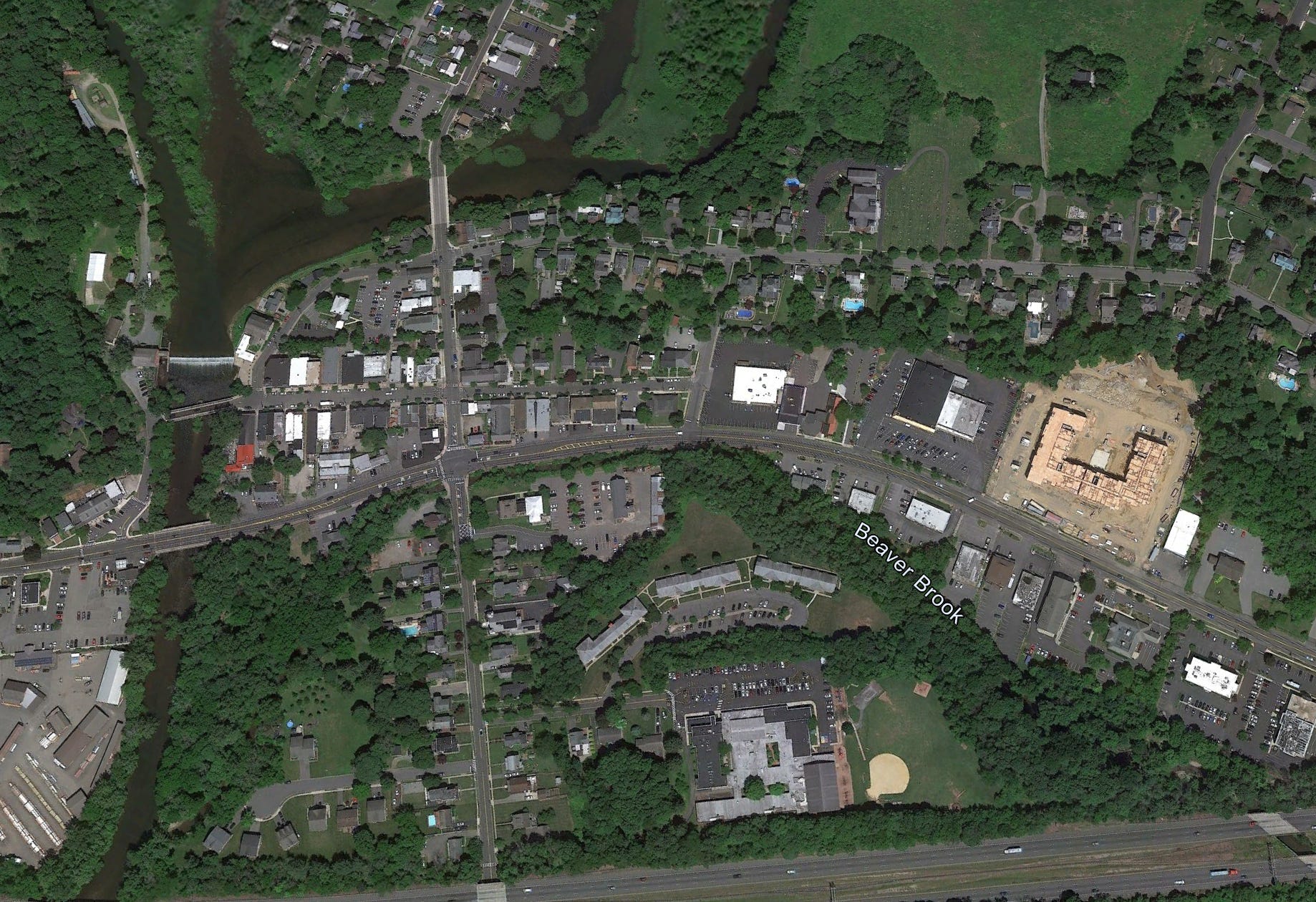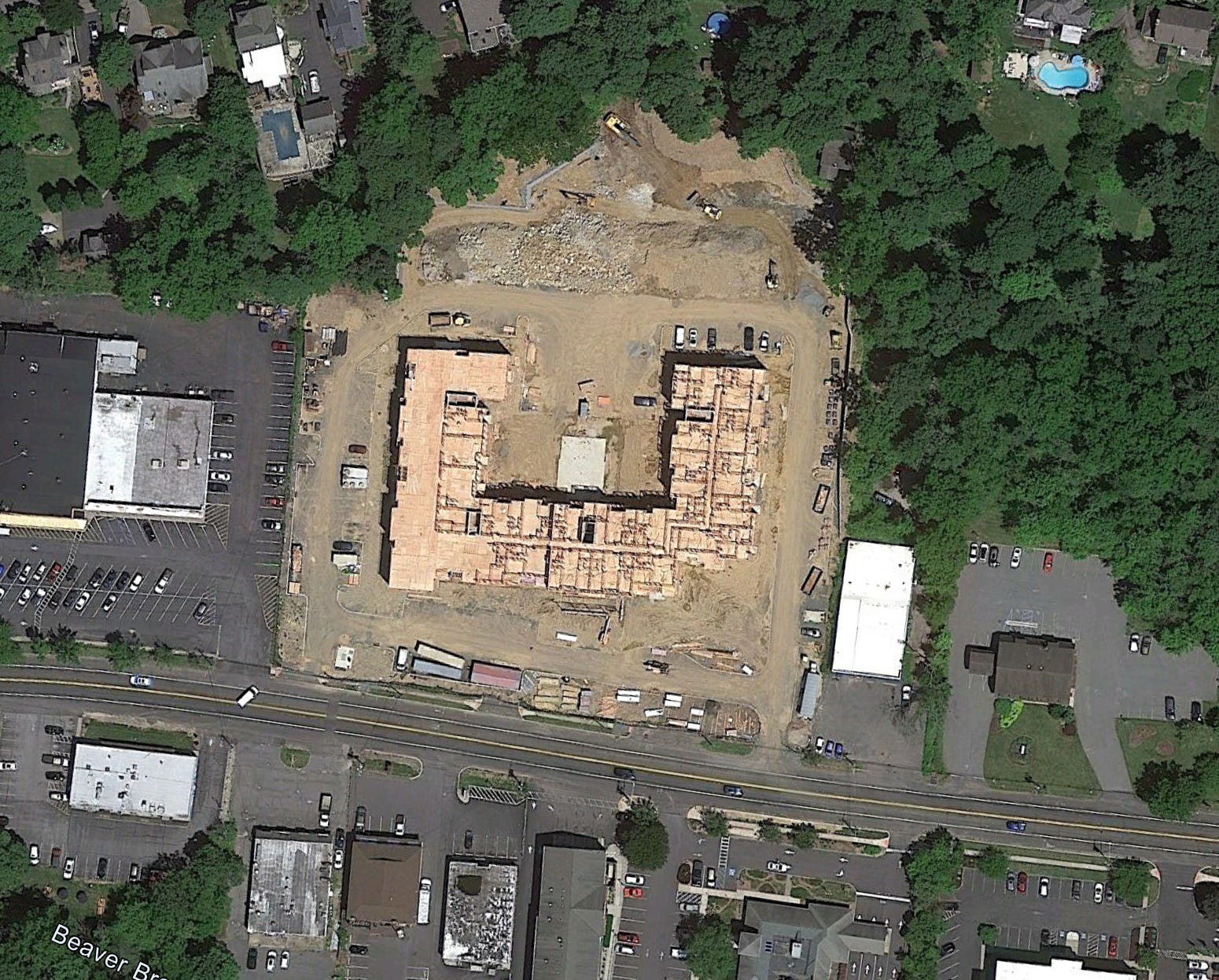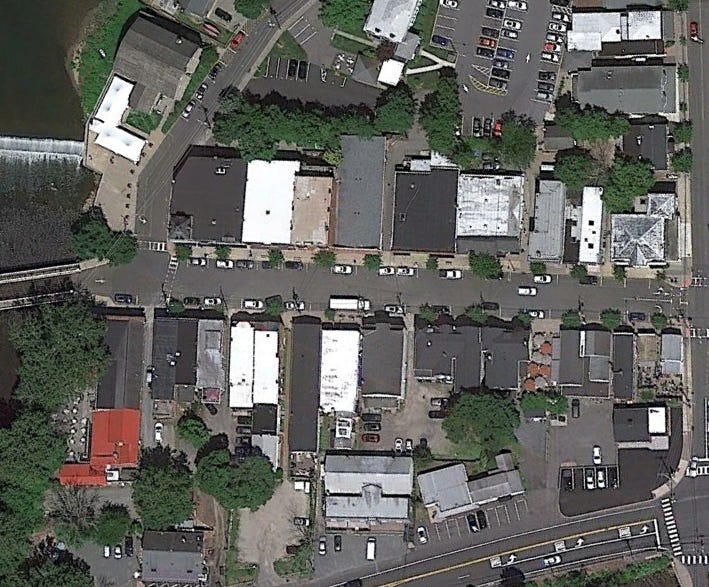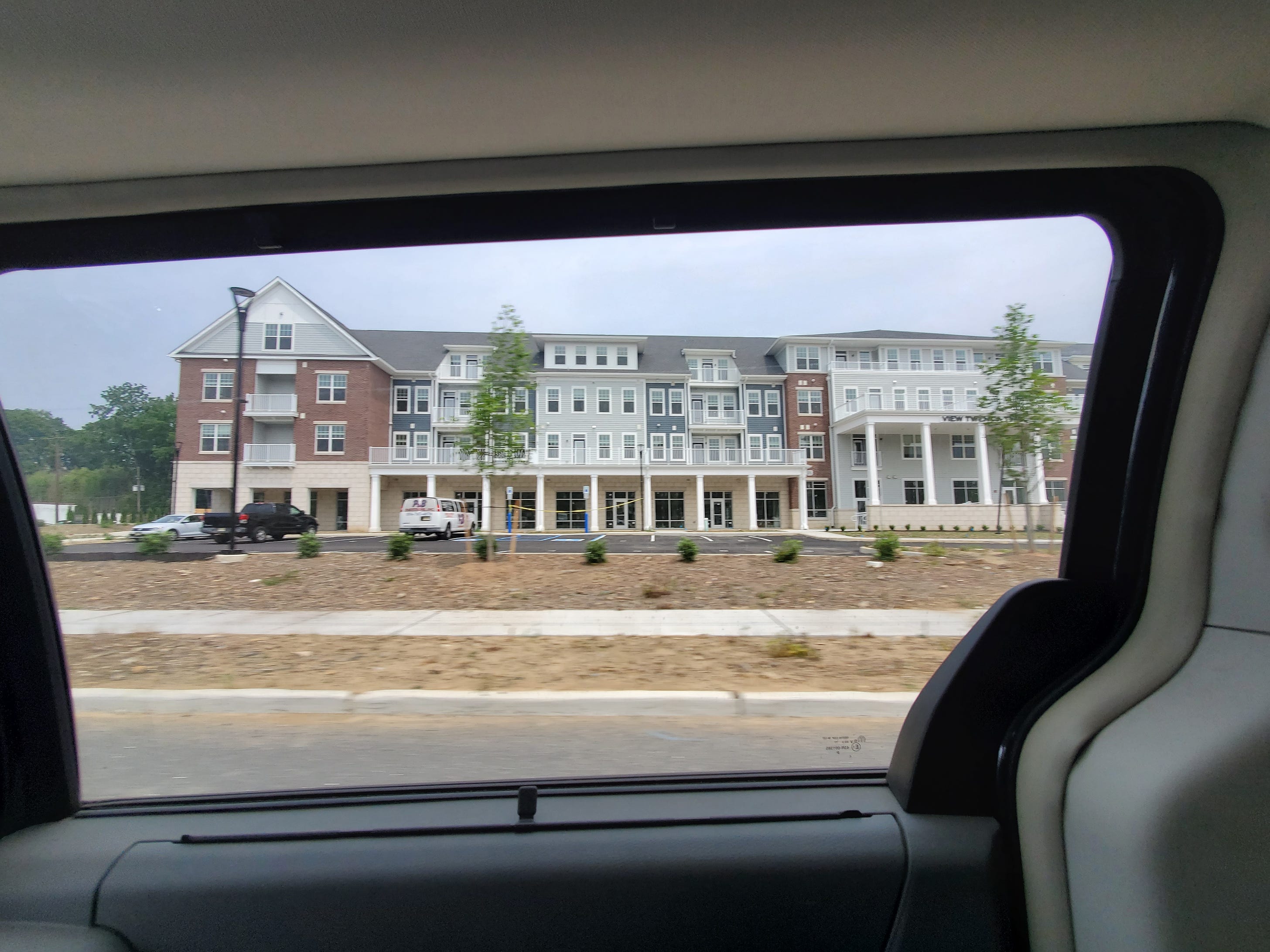The Deleted Scenes - How Important Is Scale?
Take a look at this image: This is the town of Clinton, New Jersey, in Hunterdon County. I grew up in Flemington, the county seat, and Clinton was the other nearby small town. Clinton is a small but cute and surprisingly vibrant town—more so, at least for now, than Flemington, though I think and hope that is changing. (I wrote about Flemington here.) Now do you notice anything in that image? Well, look at this: And now this: The first image is a new typical 5-over-1 apartment building called View 22, which replaced a defunct A&P supermarket from the 1970s. The second image is the core of Clinton’s old downtown/business district. And these two things are almost exactly the same size. Is that a problem? Well, I tend to think it’s not ideal. Here’s half the building out my window (Google Maps doesn’t know it’s completed yet.) It’s very, very big, and it dwarfs everything around it. At the same time, it isn’t mixed use and it doesn’t include public space. (There were supposed to be a few stores in the development, but as far as I can tell retail isn’t even mentioned on their website.) It is not an ideal form for housing demand to take in a classic small town—which is to say, a low-intensity but genuinely urban setting. View 22’s slogan is “Clinton’s new suburban oasis,” which is a funny slogan for a huge building fronting a little commercial strip and a five-minute walk from a lovely, classic downtown. I would say—though many NIMBYs would tolerate these other examples—that a big-box warehouse store or a McMansion development are symptoms of the same phenomenon. This goes far beyond aesthetics. Yes, people will call some or all of these things “ugly” or “hideous” or “soulless” or what have you. But what really distinguishes them is not their style, or size per se, but their scale. Not just physical size, but the scale at which they operate as enterprises. When people say developments like this are “too big” or “don’t fit in,” they are really pointing at something real. The DNA—legal, commercial, cultural—that underlies a small town is very different from the DNA of these large projects. Let me put it this way: I would absolutely love to see that massive parcel broken up into lots resembling the underlying subdivision of Clinton’s old downtown, and populated by the same sort of distributed pattern—a pattern, but one filled out by dozens of individuals and dozens of enterprises, not one single commercial landlord or developer. In other words, when we build in existing communities like Flemington or Clinton, I wish we would build more town. Now, some folks would oppose that too, no doubt. But just because NIMBYs oppose everything, that doesn’t mean everything is equally good or desirable. It’s tempting to treat NIMBY opposition as a sort of reverse divining rod: if they’re against it, it must be good! This, I think, explains a lot of the dysfunction and suspicion in our politics. It is, in turn, a factor in why a lot of folks out in a place like Clinton or Flemington oppose almost everything. Those left-wing European communist bike people want this, so it must be bad! In either (or any) incarnation, this is a bad impulse. A broken clock is right twice a day; the worst person in the world has a good point. There’s a reason these expressions exist. But then the question is, what form should new housing and development take? Because it has to take some form. It simply isn’t true that some places can be locked in amber and pretend they are “full” or that their evolution as places that real people live in has reached an eternal endpoint. We don’t build “more town” these days for a number of reasons, and I guess I view massive projects like View 22 as stopgaps on the way to more broadly restoring property rights and distributed enterprise. I want to build, I want to let ordinary people build, and I think when we permit that, it will happen a lot more than many people think. So I don’t oppose things like View 22, but I don’t exactly favor them. More precisely, I want a land use regime in which the incentives no longer point to projects this physically big and commercially concentrated. Related Reading: Thank you for reading! Please consider upgrading to a paid subscription to help support this newsletter. You’ll get a weekly subscribers-only post, plus full access to the archive: over 700 posts and growing. And you’ll help ensure more material like this! You're currently a free subscriber to The Deleted Scenes. For the full experience, upgrade your subscription. |
Older messages
New and Old #118
Sunday, July 16, 2023
Friday roundup and commentary
Don't Shoot the Message
Sunday, July 16, 2023
An insight on political psychology
Not-So-Gentle Giant
Tuesday, July 11, 2023
Automation and overreaction to crime degrade the customer experience
An Urban People
Monday, July 10, 2023
Montreal shows what a North American city can be
Solitude
Saturday, July 8, 2023
Thoughts on a visit to a firefly sanctuary
You Might Also Like
*This* Is How To Wear Skinny Jeans Like A Fashion Girl In 2025
Wednesday, March 12, 2025
The revival is here. The Zoe Report Daily The Zoe Report 3.11.2025 This Is How To Wear Skinny Jeans Like A Fashion Girl In 2025 (Style) This Is How To Wear Skinny Jeans Like A Fashion Girl In 2025 The
The Best Thing: March 11, 2025
Tuesday, March 11, 2025
The Best Thing is our weekly discussion thread where we share the one thing that we read, listened to, watched, did, or otherwise enjoyed recent… ͏ ͏ ͏ ͏ ͏ ͏ ͏ ͏ ͏ ͏ ͏ ͏ ͏ ͏ ͏ ͏ ͏ ͏ ͏ ͏ ͏ ͏ ͏ ͏ ͏ ͏ ͏ ͏
The Most Groundbreaking Beauty Products Of 2025 Are...
Tuesday, March 11, 2025
Brands are prioritizing innovation more than ever. The Zoe Report Beauty The Zoe Report 3.11.2025 (Beauty) The 2025 TZR Beauty Groundbreakers Awards (Your New Holy Grail Or Two) The 2025 TZR Beauty
Change Up #Legday With One of These Squat Variations
Tuesday, March 11, 2025
View in Browser Men's Health SHOP MVP EXCLUSIVES SUBSCRIBE Change Up #Legday With One of These Squat Variations Change Up #Legday With One of These Squat Variations The lower body staple is one of
Kylie Jenner Wore The Spiciest Plunging Crop Top While Kissing Timothée Chalamet
Tuesday, March 11, 2025
Plus, Amanda Seyfried opens up about her busy year, your daily horoscope, and more. Mar. 11, 2025 Bustle Daily Amanda Seyfried at the Tory Burch Fall RTW 2025 fashion show as part of New York Fashion
Paris Fashion Week Is Getting Interesting Again
Tuesday, March 11, 2025
Today in style, self, culture, and power. The Cut March 11, 2025 PARIS FASHION WEEK Fashion Is Getting Interesting Again Designs at Paris Fashion Week once again reflect the times with new aesthetics,
Your dinner table deserves to be lazier
Tuesday, March 11, 2025
NY delis are serving 'Bird Flu Bailout' sandwiches.
Sophie Thatcher Lets In The Light
Tuesday, March 11, 2025
Plus: Chet Hanks reaches new heights on Netflix's 'Running Point.' • Mar. 11, 2025 Up Next Your complete guide to industry-shaping entertainment news, exclusive interviews with A-list
Mastering Circumstance
Tuesday, March 11, 2025
“If a man does not master his circumstances then he is bound to be mastered by them.” ͏ ͏ ͏ ͏ ͏ ͏ ͏ ͏ ͏ ͏ ͏ ͏ ͏ ͏ ͏ ͏ ͏ ͏ ͏ ͏ ͏ ͏ ͏ ͏ ͏ ͏ ͏ ͏ ͏ ͏ ͏ ͏ ͏ ͏ ͏ ͏ ͏ ͏ ͏ ͏ ͏ ͏ ͏ ͏ ͏ ͏ ͏ ͏ ͏ ͏ ͏ ͏ ͏ ͏ ͏ ͏ ͏ ͏
Don't Fall for This Parking Fee Scam Text 🚨
Tuesday, March 11, 2025
How I Use the 'One in, One Out' Method for My Finances. You're not facing any fines. Not displaying correctly? View this newsletter online. TODAY'S FEATURED STORY Don't Fall for the



